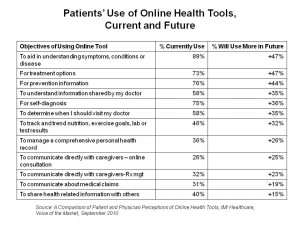 Most patients and doctors alike are currently using some type of online tool in the “understanding, management, and guidance” of health care, according to a survey from IMI Healthcare – Voice of the Market.
Most patients and doctors alike are currently using some type of online tool in the “understanding, management, and guidance” of health care, according to a survey from IMI Healthcare – Voice of the Market.
Virtually all physicians, and 73% of patients, are using some kind of online health tool. Based on the IMI Healthcare survey methodology, these tools include health content sites, used by 57% of patients and 77% of doctors (e.g., WebMD, mayoclinic.com); general search sites (e.g., Wikipedia), used by 48% of patients and 68% of doctors; health association sites (e.g., American Heart Association), used by 19% of patients and 63% of doctors; employer or health plan service sites, used by 19% of patients and 13% of doctors; and, personal health records, such as Google Health and Microsoft HealthVault, used by 16% of patients and 21% of doctors, according to the poll.
While both physicians and patients plan to use online tools even more in the future, there are some disconnects between them on what objectives rank at the top of their lists — particularly, how patients see the role of pharmacists (highly valued). as well as the role of friends and family (lower for people than doctors think).
For patients, several online tools will increase in importance in the future: specifically, tools for helping them understand conditions, how to self-diagnose, prevent illness, and better understanding information shared by doctors.
For physicians, online tools that will be more important in the future will be those that help them provide patients with educational materials, prevention information, diagnostics (for them to use with patients), and treatment and prescription options for a patient.
IMI Healthcare conducted the survey in September 2010 among 117 patients and 52 general practitioners in the U.S.
Health Populi’s Hot Points: While the survey sample employed in this study is very small, there are a few patterns worth noting as discussed above. A key disconnect is worth probing, which arises in other studies: that is consumers’ high-value for pharmacists in their lives. The pharmacist seems to be downplayed by physicians (although I reiterate: only 52 GPs were polled in the study).
Pharmacists will play growing roles in the increasingly retail-facing health ecosystem in the U.S. They’re fairly ubiquitous – in freestanding chain pharmacies, Big Box retailers, and grocery stores. Pharmacists will be an important complement to the primary care physician shortage. Doctors may not place much value on pharmacists today, but tomorrow–with the addition of 30+ million Americans into health insurance plans–doctors will be depending more on the primary, grassroots role played by community pharmacists. Look for the pharmacy to be a value-add to the patient-centered medical home team.




 Thanks to Feedspot for naming this blog, Health Populi, as a
Thanks to Feedspot for naming this blog, Health Populi, as a